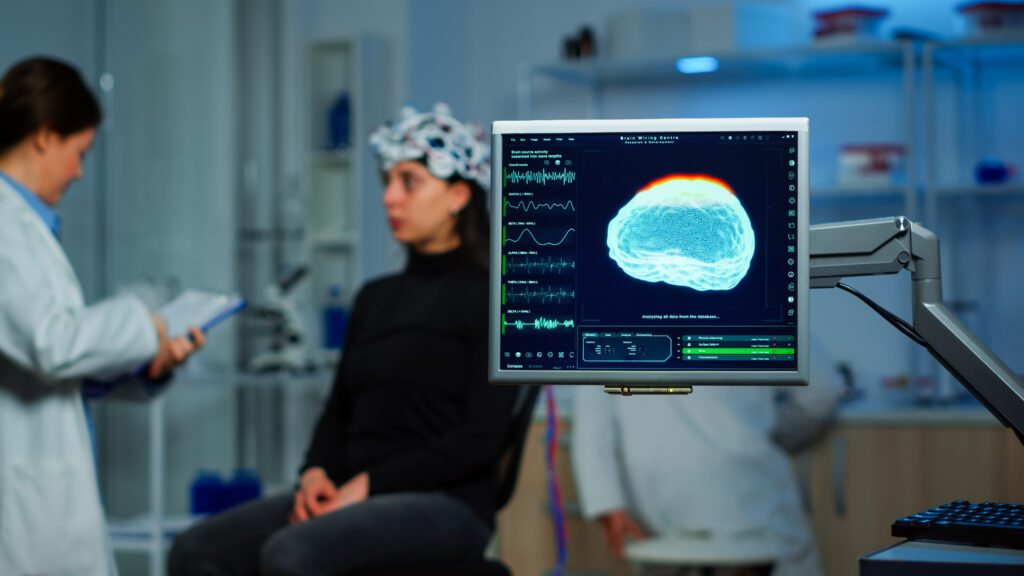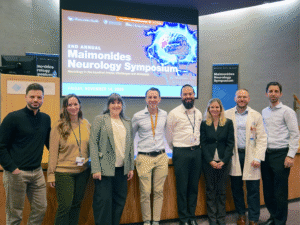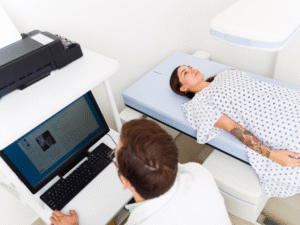Epilepsy can appear in patients at any age, even if they don’t have other neurological conditions. One in 26 people develop epilepsy during their lifetime.* Epilepsy affects everyone differently, which can make getting the appropriate treatment complicated. Fortunately, Maimonides Medical Center is at the leading edge of comprehensive epilepsy care.
Maimonides Division of Neurology Services takes a multidisciplinary and multi-institutional approach to delivering medical and surgical treatments for this intricate disease. They provide the highest level of individualized care using the most advanced diagnostics, says Benjamin Cunningham, MD, Director of Epilepsy at Maimonides Medical Center.
“Epilepsy is a complex condition that requires personalized and nuanced care for everyone. Providing this care across an ethnically and socioeconomically diverse community like Brooklyn is a unique challenge,” he says. “The experienced, expert-trained physicians we have here at Maimonides, along with our ancillary staff, serve as the connectors for all aspects of care. We’re dedicated to tackling this challenge.”
The Only Comprehensive Epilepsy Center in Brooklyn
Maimonides is the only comprehensive epilepsy center in Brooklyn. To deliver this high level of service, our epileptologists partner with other epilepsy specialists at SUNY Downstate and Kings County Hospital Center. Together, these facilities earned designation as a Level 3 epilepsy center through the National Association of Epilepsy Centers.
Maimonides clinicians collaborate closely across specialties to provide a full range of medical, neuropsychology, and surgical services to patients with various types of epilepsy. Through weekly conferences, providers discuss diagnostic approaches, possible surgical options (when appropriate), and long-term treatment plans for complex or otherwise challenging cases.
“Weekly multidisciplinary conferences are usually done at Level 4 centers that perform surgical procedures, so as a Level 3 center we are unique,” says Susanna O’Kula, MD, a Maimonides epileptologist. “First, we reach a group consensus internally, which means eight epileptologists are thinking critically about a patient’s case. That level of coordination is invaluable.”
Maimonides and its Level 3 partners don’t perform surgical interventions for epilepsy. But they still help coordinate this care, Dr. Cunningham says. Through existing agreements, they refer patients to larger Level 4 centers in the surrounding area. The Maimonides team also provides all pre-surgical and post-surgical care and therapy.
“Epilepsy is a chronic condition that requires management over the course of years — and for some people, the course of their lives,” says Dr. Cunningham. “Many of them, at some point, may require a surgical intervention that we can coordinate through our relationships in Manhattan. But, otherwise, from start to finish, our patients receive continuous, top-notch epilepsy care from us right here in Brooklyn.”
Thorough Diagnostic Testing
Because epilepsy can appear at any time and affect patients in multiple ways, diagnosis can be difficult. But accurately identifying the source of a patient’s seizures is critical, Dr. O’Kula says. Consequently, Maimonides’ epileptologists rely on a wide range of diagnostic tools to determine if patients need medication or surgical intervention.
Depending on a patient’s symptoms, providers can record inpatient electroencephalogram (EEG) videos to characterize seizures, perform routine EEG studies in an outpatient lab, or refer individuals for ambulatory EEGs. Maimonides neurologists collaborate with a neuropsychologist to lateralize and localize language and memory function and perform epilepsy-protocol brain MRIs that can identify any brain damage or lesions that could generate seizures.
In conjunction with neurointerventionalists and a neuropsychologist, epileptologists conduct Wada testing to characterize critical language and memory functions. By using live X-ray imaging, contrast dye, and anesthesia, they can determine which parts of the patient’s brain are most involved in those activities. The results are essential to pre-surgical planning because they provide vital information about the strengths and deficits of both sides of the brain.
Genetic testing is available for patients with nonlesional or unusual cases of epilepsy, Dr. Cunningham says. With a simple cheek swab, Maimonides’ epileptologists test individuals for 300 of the most common epilepsy-linked genes.
“In many instances, these pathologically identified genes have helped us educate our patients and guide our conversations around their prognosis and clinical source,” he says. “In some instances, it helps us better tailor their therapy.”
A Wide Range of Treatment Options
Anti-seizure medication is the first line of epilepsy treatment. At Maimonides, patients have access to traditional prescriptions and newer ones that show promise as maintenance and rescue medications.
“We want to ensure our patients have options for emergency treatment of seizures either by themselves or by a family member,” Dr. Cunningham says. “We are advocates and feel comfortable using these newer, valuable therapies.”
However, up to one-third of patients won’t respond to medication. For them, Maimonides offers a path towards therapeutic surgical intervention, including implantation of therapeutic neuromodulation devices such as vagal nerve stimulation. For other interventions including surgical resection, laser ablation, or implantation of a deep brain stimulator or responsive neurostimulation device, Maimonides epileptologists handle all pre-surgical planning and post-operative follow-up.
“What’s appealing to other physicians is the ability to refer patients to us so patients don’t have to travel into Manhattan,” Dr. Cunningham says. “We have the expertise in managing all these therapeutic devices and any coordination needed around procedures.”
An Open Door for Patients
Maimonides epileptologists routinely provide evaluation and EEG monitoring services for patients in the hospital’s various intensive care units. However, patients in the community also have easy access to the providers’ expertise.
“We’re here to help with both diagnosis and management for patients who have recurrent unexplained loss of consciousness and recurrent confusional or funny spells that may or may not be seizures,” Dr. Cunningham says. “Whether patients have an established diagnosis of epilepsy or are experiencing epilepsy-like symptoms with an unconfirmed cause, it’s appropriate to send them to us for further evaluation. That’s a reasonable starting point.”
Learn more about epilepsy care at Maimonides Medical Center at https://maimo.org/treatments-care/stroke-and-neurosciences/neurology/ or call 718-283-7470 to make an appointment or referral.
* https://www.epilepsy.com/what-is-epilepsy/statistics




